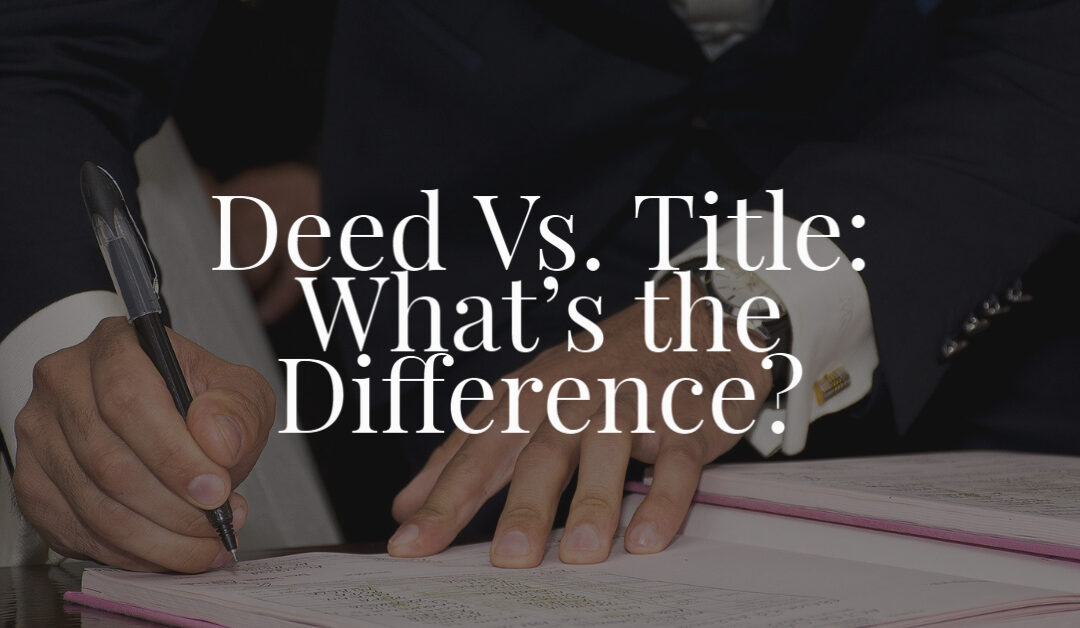“Owning” a house can be a confusing concept. The deed of trust is usually held by a bank and your role is as a paying loan holder. Legally, you have only bought a portion of it, but everyone says that you “own” the home.
Titles and deeds explain more about who actually “owns” a home. Understanding the definition of these terms is helpful when considering titling issues, liens, and deeds of trust.
Let’s look at what titles and deeds actually are and what they each mean for your journey of home ownership.
Who Holds the Deed?
When you buy a home, the actual physical deed in your name shows that you own equitable title to the property, but the trustee of the deed of trust holds the physical copy of the deed.
In Texas, the seller signs the deed over to you in front of a notary public and the deed is then filed in the county clerk’s office so that the transfer of property is officially recorded. At this point, the trustee holds the physical deed, you hold equitable title and the lender holds the legal title.
What is the Difference?
A deed is a physical legal document declaring your lawful ownership of a property. The title is a conceptual idea of who has ownership rights. Although you can own a physical copy of a book, you can’t hold a book’s title in your hand.” (1)
When you buy a home in Texas, you have a legal concept of ownership called the “titling” of the home. The deed is the physical document that contains all of the information about the titling and ownership of the home. The deed shows when the title for a home has changed hands from a seller (grantee) to a buyer (grantor).
Grantee and grantor are legal terms that you probably don’t need to know. However, once you enter into an agreement for a deed of trust with a lender, you are no longer called the “grantor”. In the deed of trust, you are called the “obligor”.
Explanation of “A Deed of Trust”
With a deed of trust, you are borrowing money from a lender to purchase a house. You execute a deed of trust with your lender (the “beneficiary”) and you are the “obligor”.
The beneficiary, your lender, appoints a trustee. The trustee collects your loan payments and holds the physical deed to the house until you pay the home off. The deed of trust creates a lien against your house as collateral to help ensure that you repay the debt.
With a deed of trust, the titling is a bit different than in a mortgage. As the obligor, you hold what is called “equitable title” while the beneficiary (your lender) holds legal title. Legal title means that the lender has the right to work with the trustee to take the property away from you if you foreclose (stop paying each month).
Equitable title means that you have a financial interest because you have been investing in your home monthly. When you pay off your home, you are paying off the lien on your title so that you possess both equitable title and legal title for your home at that point.
Why is a Deed Important?
Your deed contains a description of the property. It also tells you what kind of rights you have as the property owner. If someone else owned your home before you bought it and has a claim to the property, they could sue you for ownership. This is why the type of deed is important.
What the deed says about past ownership and about guarantees assures your rights as a property owner. You have more or less rights as owner depending on the type of deed you have signed.
General Warranty Deed (The Most Protection)
With a general warranty deed, the grantor warrants to you that the title to the property is free and clear of any other claims. The grantor is stating that they have no knowledge of any property issues. This type of deed has the broadest level of protection as an owner.
Some of the issues that a grantee must disclose are included on standard disclosure forms for Texas Realtors. Issues that are not required to be disclosed include:
- A death in a house in Texas unrelated to the condition of the property
- The HIV status of any occupants of the property
- Conditions that you are truly unaware of
Special Warranty Deed (Less Protection)
“A special warranty deed only guarantees title for the time the property was owned by the seller. This type of deed is not typically used for home purchases, but rather for purchase of commercial property.” (1)
Quitclaim Deed (No Protection)
In a quitclaim deed, the grantee makes no claim about the property at all. There are no protections or assurances for this type of deed. These are often used between family members or for moving a deed into another name.
Quitclaims are often used:
- When parents transfer deed to a child
- To transfer deed into a trust or LLC
- When one spouse transfers a deed to the other spouse
Putting it All Together
Owning a house is a responsibility that involves having the knowledge to take care of your new home. Now that you know the difference between deeds and titles, you can confidently discuss your legal rights as a homeowner and understand fully what type of deed you have and how home ownership and deeds of trust work in Texas.
Seek Counsel
If you have any issues with liens, titling concerns, property disputes, or are facing foreclosure, talk with an experienced real estate attorney who can guide you through whatever you are dealing with. Because of the extensive knowledge of the laws involved in Texas property and real estate law, your attorney can be a resource who can help you through any issues you need legal assistance with.
- https://www.quickenloans.com/learn/deed-vs-title
- https://www.virtualunderwriter.com/en/underwriting-manuals/2013-1/UMTX00000147.html



Recent Comments